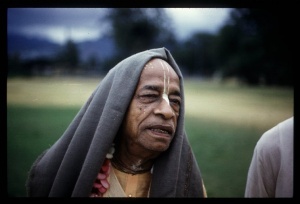CC Madhya 19.191: Difference between revisions
m (1 revision(s)) |
(Vanibot #0054 edit - transform synonyms into clickable links, which search similar occurrences) |
||
| (One intermediate revision by one other user not shown) | |||
| Line 1: | Line 1: | ||
{{ | [[Category:Sri Caitanya-caritamrta - Madhya-lila Chapter 19|C191]] | ||
<div style="float:left">'''[[Sri Caitanya-caritamrta|Śrī Caitanya-caritāmṛta]] - [[CC Madhya|Madhya-līlā]] - [[CC Madhya 19|Chapter 19: Lord Śrī Caitanya Mahāprabhu Instructs Śrīla Rūpa Gosvāmī]]'''</div> | |||
<div style="float:right">[[File:Go-previous.png|link=CC Madhya 19.190|Madhya-līlā 19.190]] '''[[CC Madhya 19.190|Madhya-līlā 19.190]] - [[CC Madhya 19.192|Madhya-līlā 19.192]]''' [[File:Go-next.png|link=CC Madhya 19.192|Madhya-līlā 19.192]]</div> | |||
{{CompareVersions|CC|Madhya 19.191|CC 1975|CC 1996}} | |||
{{RandomImage}} | |||
==== TEXT 191 ==== | ==== TEXT 191 ==== | ||
<div | <div class="verse"> | ||
madhura-rase bhakta-mukhya—vraje gopī-gaṇa | :madhura-rase bhakta-mukhya—vraje gopī-gaṇa | ||
mahiṣī-gaṇa, lakṣmī-gaṇa, asaṅkhya gaṇana | :mahiṣī-gaṇa, lakṣmī-gaṇa, asaṅkhya gaṇana | ||
</div> | </div> | ||
| Line 12: | Line 16: | ||
==== SYNONYMS ==== | ==== SYNONYMS ==== | ||
<div | <div class="synonyms"> | ||
madhura- | ''[//vanipedia.org/wiki/Special:VaniSearch?s=madhura&tab=syno_o&ds=1 madhura]-[//vanipedia.org/wiki/Special:VaniSearch?s=rase&tab=syno_o&ds=1 rase]'' — in the mellow of conjugal love; ''[//vanipedia.org/wiki/Special:VaniSearch?s=bhakta&tab=syno_o&ds=1 bhakta]-[//vanipedia.org/wiki/Special:VaniSearch?s=mukhya&tab=syno_o&ds=1 mukhya]'' — the chief devotees; ''[//vanipedia.org/wiki/Special:VaniSearch?s=vraje&tab=syno_o&ds=1 vraje]'' — in Vṛndāvana; ''[//vanipedia.org/wiki/Special:VaniSearch?s=gopī&tab=syno_o&ds=1 gopī]-[//vanipedia.org/wiki/Special:VaniSearch?s=gaṇa&tab=syno_o&ds=1 gaṇa]'' — the ''gopīs''; ''[//vanipedia.org/wiki/Special:VaniSearch?s=mahiṣī&tab=syno_o&ds=1 mahiṣī]-[//vanipedia.org/wiki/Special:VaniSearch?s=gaṇa&tab=syno_o&ds=1 gaṇa]'' — the queens in Dvārakā; ''[//vanipedia.org/wiki/Special:VaniSearch?s=lakṣmī&tab=syno_o&ds=1 lakṣmī]-[//vanipedia.org/wiki/Special:VaniSearch?s=gaṇa&tab=syno_o&ds=1 gaṇa]'' — the goddesses of fortune in Vaikuṇṭha; ''[//vanipedia.org/wiki/Special:VaniSearch?s=asaṅkhya&tab=syno_o&ds=1 asaṅkhya] [//vanipedia.org/wiki/Special:VaniSearch?s=gaṇana&tab=syno_o&ds=1 gaṇana]'' — of innumerable reckoning. | ||
</div> | </div> | ||
| Line 19: | Line 23: | ||
==== TRANSLATION ==== | ==== TRANSLATION ==== | ||
<div | <div class="translation"> | ||
“The chief devotees in conjugal love are the gopīs in Vṛndāvana, the queens in Dvārakā and the goddesses of fortune in Vaikuṇṭha. These devotees are innumerable. | “The chief devotees in conjugal love are the gopīs in Vṛndāvana, the queens in Dvārakā and the goddesses of fortune in Vaikuṇṭha. These devotees are innumerable. | ||
</div> | </div> | ||
__NOTOC__ | |||
<div style="float:right; clear:both;">[[File:Go-previous.png|link=CC Madhya 19.190|Madhya-līlā 19.190]] '''[[CC Madhya 19.190|Madhya-līlā 19.190]] - [[CC Madhya 19.192|Madhya-līlā 19.192]]''' [[File:Go-next.png|link=CC Madhya 19.192|Madhya-līlā 19.192]]</div> | |||
__NOTOC__ | |||
__NOEDITSECTION__ | |||
Latest revision as of 22:27, 19 February 2024
Śrī Caitanya-caritāmṛta - Madhya-līlā - Chapter 19: Lord Śrī Caitanya Mahāprabhu Instructs Śrīla Rūpa Gosvāmī

His Divine Grace
A.C. Bhaktivedanta Swami Prabhupada
A.C. Bhaktivedanta Swami Prabhupada
TEXT 191
- madhura-rase bhakta-mukhya—vraje gopī-gaṇa
- mahiṣī-gaṇa, lakṣmī-gaṇa, asaṅkhya gaṇana
SYNONYMS
madhura-rase — in the mellow of conjugal love; bhakta-mukhya — the chief devotees; vraje — in Vṛndāvana; gopī-gaṇa — the gopīs; mahiṣī-gaṇa — the queens in Dvārakā; lakṣmī-gaṇa — the goddesses of fortune in Vaikuṇṭha; asaṅkhya gaṇana — of innumerable reckoning.
TRANSLATION
“The chief devotees in conjugal love are the gopīs in Vṛndāvana, the queens in Dvārakā and the goddesses of fortune in Vaikuṇṭha. These devotees are innumerable.